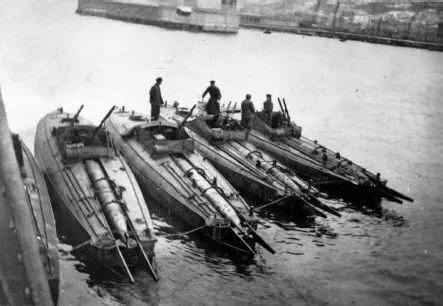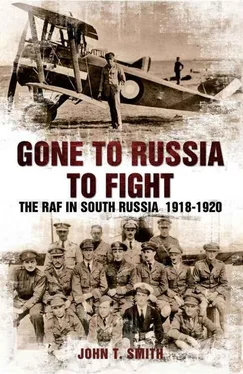With the Bolshevik fleet frozen in at Astrakhan, there was no contact between the Red navy and the British ships on the Caspian. But the British ships did continue to patrol the line of the ice in case any ships did break out, as the Reds were equipped with ice-breakers.
During March, the Don Cossack Army was able to regain some of the territory it had lost. The Cossacks advanced to the north but were never able to capture Tsaritsin to the east. General Wrangel was severely ill with typhus during the month of March, and most of his troops were transferred to the left wing of the Volunteer Army in the Donitz area. Only the cavalry division under the command of General Ulagai was left in the north Caucasus area, and this was not strong enough to continue the advance towards Astrakhan. The first British ship carrying military supplies for General Denikin arrived in Novorossisk during March.
Captain Sadler, the commanding officer of 266 Squadron, had left Mudros on 18 February on board HMS Engadine with the first group of men and aircraft for the squadron. By 1 March, they were in Batum waiting to be transported to Petrovsk port. Also on the same day, Lieutenant Bilney arrived in Petrovsk to set up the base for 266:
…arrived at Petrovsk on March 1st. This was a small town of 4/5000 inhabitants and owed its existence to its good but quite small harbour. The town was under deep snow when we arrived and we didn’t get rid of it for some time. The British force consisted of a Company of Punjabis, relieved at a later date by Ghurkhas. The town Major had arranged quarters for us in the Anglo Asiatic Bank building, and this remained Wing HQ throughout our stay. [1]
Using local labour, Bilney organised the conversion of a wool warehouse at the side of the harbour into living quarters for the squadron airmen. Open-sided sheds were used as hangars for the aircraft and other storage sheds were converted into workshops.
Short 184 being lifted into the water at Petrovsk port. Captain Sadler was right in observing that the crane was too small.
A mobile crane to lift the seaplanes onto the water was found and installed alongside the quay. Counting Captain Sadler, eight officers and fifty-one ratings arrived with six aircraft in Petrovsk on 10 March. The officers went into billets at the meteorological office. When the machines were unpacked from their crates, it was found that the vital exhaust manifolds were missing and these had to be constructed locally by the squadron mechanics. The second half of the squadron arrived on 20 March with four more aircraft.
The chronic bad weather was still limiting flying by 221 Squadron. On 13 March, several demonstration flights were made over the local countryside to impress the locals. A DH9 crashed into the sea during one of these flights, which cannot have impressed the locals too much. The pilot and observer were rescued. This was the fourth aircraft lost. The squadron records state that ‘the daily sick attendance at 221 Squadron is high’. Extreme weather, bad conditions, and poor morale were starting to affect the squadron. Even the redoubtable D. B. Knock was affected:
17/3/19 Develop chronic teeth trouble, followed by fever of some kind. High temperature. MO cannot diagnose. Says I must be sent to Baku hospital.
18/3/19 Loaded on train for Baku along with two other chaps, and after rotten trip arrive there on 19th. On my back for days. Fever dies slowly and teeth bad. Convalescent and report to military dentist on 30th. Five teeth to fix up. [2]
Most of the officers and men had spent the First World War in the eastern Mediterranean and the cold in Russia must have come as a shock.
On 24 March, a demonstration flight was made over Petrovsk. Three DH9s also made a demonstration flight over Baku on 25 March. On the same day, a flight was made to Chechen Island to find a suitable landing field for an advanced base. It was found that the island was still iced up, but a likely landing ground was found for the future. Other demonstration flights were made on 27, 28, 30, and 31 March. But no effective liaison had been established with the White Armies, and the British aircrew did not know which were Red Army and which were Volunteer Army units, thus enabling them to carry out effective attacks.
Commodore Norris finally managed to disband the Centro-Caspian Flotilla during March after the CMBs fired two torpedoes at ships of the Flotilla. The sailors of the Flotilla decided that discretion was the better part of valour and abandoned their vessels. While the Bolshevik fleet was iced in at Astrakhan, the British ships were now the only effective naval force on the Caspian. Three of the Flotilla’s ships were taken over by the British and renamed the Windsor Castle , Dublin Castle , and Orlionoch , which later replaced the Alader Youssanoff as the seaplane carrier. Four of the CMBs were stationed at Baku, four at Petrovsk, and four were carried on the two ships. As more ships were taken over, some of the older ships were paid off. The number of ships available to the British never exceeded eight armed merchantmen, two CMB carriers, and one seaplane carrier.

Five Coastal Motor Boats alongside HMS Kruger in Baku harbour on 1 March 1919 during the surrender of the Centro-Caspian Flotilla.
By the end of March, both 221 and 266 were in place at Petrovsk, waiting for the extreme winter weather to break so they could play a part in the war against the Red forces.
At the start of April, General Wrangel was still too ill to take part in the fighting. The Don Cossack army was under pressure in the north, and the Volunteer Army was being forced back in the area north of the Crimea and the Donitz area. Stationed at Tsaritsin was the Soviet 10th Red Army, reinforced with the remnants of the 11th Army. During April, this force began a major advance south-west along the rail line running between Tsaritsin and Ekaterinodar. In command was General Egorov; the leader of his cavalry forces was General Dumenko. The weakened White forces were driven back, and Dumenko’s cavalry advanced to within fifty miles of Rostov. If this advance had been allowed to continue, the Armed Forces of South Russia would have been cut in two.
As the result of a disagreement with General Denikin, Wrangel refused to take command of the White forces to block the advance. This forced Denikin to take personal command, the last time he commanded forces in the field. Denikin managed to stabilise the situation on the west bank of the Manych River. In his memoirs, Wrangel claimed that Denikin begged him to take command of the counter-attack, and he finally agreed to do so at the end of the month.
Conditions for the men at 221 Squadron were still grim. During the month, Major Andrews was invalided home:
In April I contracted typhus whilst on a ground reconnaissance north of Petrovsk. The Squadron Medical Officer had no experience with this fever, and the medical supplies were inadequate, but the deficiencies were made good by the despatch from Baku of a Welsh miner, turned Nursing Orderly, who had been through the Serbian retreat. In future I would not light-heartedly set out on an expedition, in a pestilence-stricken country, without a knowledgeable medical staff and suitable medical stores. [1]
The armourer Knock, meanwhile, was still receiving medical treatment in Baku.
The plan to create the advanced base on Chechen Island, seventy miles north of Petrovsk, was put into practice. Chechen Island was described as an uninhabited sand bank, and the nearest mainland was just within range of Red Army cavalry patrols. The island was not a popular base among the RAF men. The Royal Navy also used the island as an anchorage for their ships. Early in the month, demonstration flights were carried out when the weather permitted. Colonel Bowhill wrote in the Wing diary:
Читать дальше













